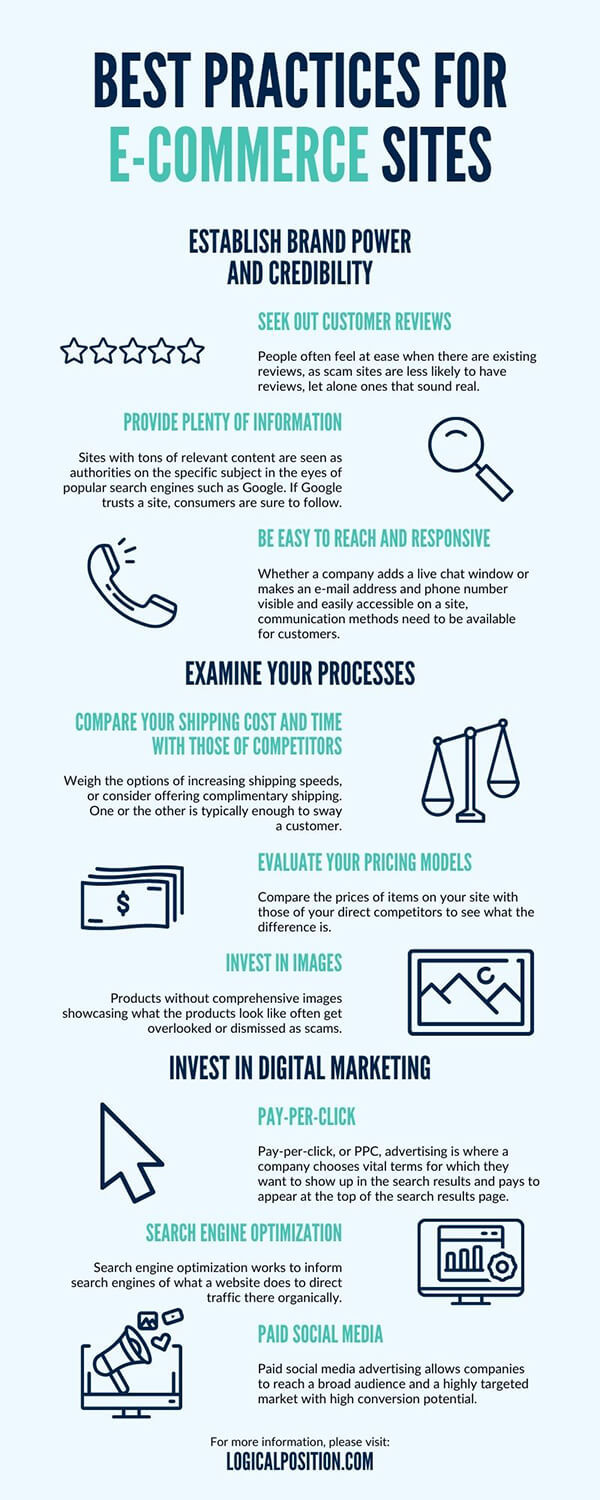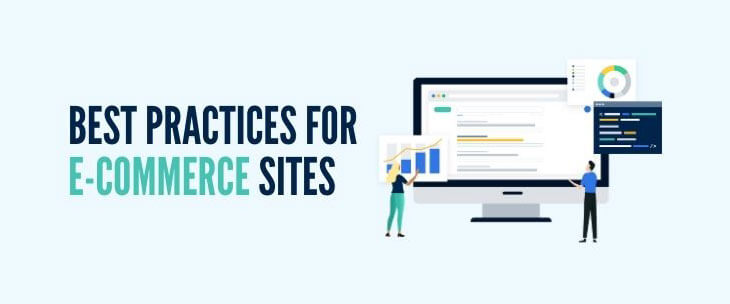E-commerce is a booming industry. It has experienced exponential growth during the past decade, but also a ton in the past year. With the COVID-19 pandemic sweeping the globe, more people than ever before have begun turning to e-commerce sites for all their needs. The convenience of online shopping continues to drive people to e-commerce sites. This demand means more and more companies are popping up online, and many are selling competing, identical, or similar products. Most, if not all, e-commerce businesses are experiencing market saturation. Market saturation makes digital marketing essential to the continued success of e-commerce sites. Discover the best practices for e-commerce sites here.
Establish Brand Power and Credibility
One of the side effects of the sheer number of e-commerce sites available is plenty of scam websites imitating them. This influx of fraudulent websites creates automatic skepticism in consumers. People are automatically suspicious of most e-commerce sites upon their first visit. This natural distrust means legitimate e-commerce sites must work hard to establish trust, power, and credibility.
Seek Out Customer Reviews
One way to get new customers to trust your site is to publish the opinions of previous customers. People often feel at ease when there are existing reviews, as scam sites are less likely to have reviews, let alone ones that sound real. Reach out to existing customers and ask them to leave honest reviews about their experiences on your website. Sometimes offering a discount on a future purchase in exchange for an honest review works well to motivate customers to put in the time to write a review.
Provide Plenty of Information
Put tons of information on your site. Write content about each product on product pages. Include informational content on your site’s category pages; the more helpful and relevant information a site can provide, the better. Sites with tons of relevant content are seen as authorities on the specific subject in the eyes of popular search engines such as Google. If Google trusts a site, consumers are sure to follow.
Be Easy To Reach and Responsive
Another important factor in trust and credibility is the consumer’s ability to get in touch with you. Whether a company adds a live chat window or makes an e-mail address and phone number visible and easily accessible on a site, communication methods need to be available for customers. Merely providing the opportunity to contact the store isn’t enough. Stores need to have customer service representatives ready to respond quickly. The standard reply time customers expect is within 24 hours.
Start a Blog
Starting a blog is another way to get more content onto an e-commerce site. Regularly posting blogs about topics relevant to the site’s product offerings indicates to search engines that a site is updated. Blogs also help consumers learn more about products and get answers to any questions they have.
Examine Your Processes
It’s also vital to examine the existing processes and logistics of the e-commerce business. Digital marketing is essential to keeping up with the competition from other e-commerce sites, but it can only go so far, as other things are always happening with the business’s processes.
Compare Your Shipping Cost and Time with Those of Competitors
Shipping is a huge factor for buyers when they’re shopping online. The expectation of near-instant shipping times is rapidly increasing because of precedents set by big-box online retailers. Suppose your website is experiencing a low conversion rate or difficulty establishing customer lifetime value. In that case, the issue could be slow shipping speeds. Weigh the options of increasing shipping speeds, or consider offering complimentary shipping. One or the other is typically enough to sway a customer.
Evaluate Your Pricing Models
The nature of e-commerce sites means competing websites likely have the same items or similar items for sale. Many times, this means the site that gets the conversion is the one with the lowest pricing. Compare the prices of items on your site with those of your direct competitors to see what the difference is. If your products are much higher in price, ensure they offer higher-quality or better features; otherwise, you could lose sales due to your high pricing.
Invest in Images
Products without comprehensive images showcasing what the products look like often get overlooked or dismissed as scams. Invest in creative images of your products, and try to provide unique photos rather than stock images from manufacturers. Anything extra helps your site stand out among the competitors and create more conversions.
Consider Customer Service
People expect positive experiences with customer service. E-mail updates about orders are significant, as is providing tracking numbers for packages. Perhaps the most crucial factor in customer service is inquiry response times. Consumers want responses to their inquiries as immediately as possible. Investing in a live chat window or checking e-mails every hour can cut down on your customers’ customer service gap frustration. Rapid responses also establish trust.
Invest in Digital Marketing
Investing in digital marketing is an essential part of running a successful e-commerce business. Nearly every e-commerce company invests in some form of digital marketing successfully, leaving behind those that don’t. E-commerce companies cannot reach their full potential without investing in digital marketing methods.
Pay-Per-Click
Pay-per-click, or PPC, advertising is where a company chooses vital terms for which they want to show up in the search results and pays to appear at the top of the search results page. The company only pays for that ad space when a customer clicks on it. PPC works to drive traffic to a site.
Search Engine Optimization
Search engine optimization, or SEO, is a long-term solution to online visibility. Search engine optimization works to inform search engines of what a website does to direct traffic there organically.
Paid Social Media
Paid social media advertising allows companies to reach a broad audience and a highly targeted market with high conversion potential. It’s a perfect platform for ad remarketing and working with repeat ad exposures.
E-mail Marketing
E-mail marketing is essential for e-commerce sites to improve customer lifetime value. Many repeat sales for e-commerce sites come from e-mail marketing. E-mail marketing reminds people of their abandoned carts, provides direct calls to action, and keeps customers informed about what’s happening on the site. People won’t typically check a company’s site regularly to look for information on sales or promotions, but they will click on an e-mail and learn about them that way.

There are many claims out there about what the best practices for e-commerce sites are. Even though many e-commerce sites sell similar or identical items, the stores are still unique. Investing in digital marketing is necessary for a company to reach its full online potential. Without digital marketing, it’s easy to fall behind the competition.
At Logical Position, we provide high-quality digital marketing services tailored to your unique business. Our experts can curate a PPC strategy designed with your business’s goals in mind. We provide pay-per-click and Google Shopping campaigns to expand your horizons beyond paid search. Contact us today for more information and for a free consultation on your site.




